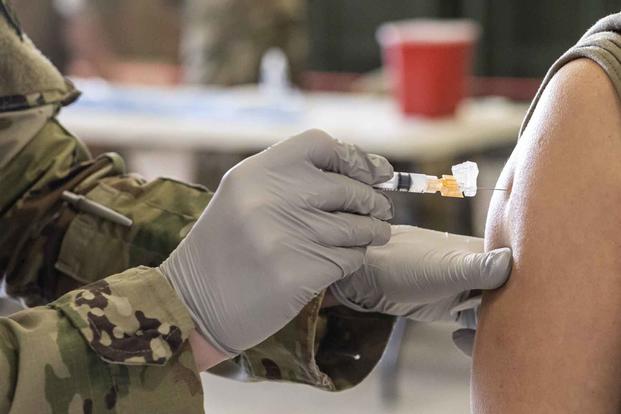Defense Secretary Lloyd Austin said Friday that 70% of active-duty troops have received at least one shot of a COVID-19 vaccine. But that is far behind the Pentagon's original goal, when officials suggested earlier this year that the whole force could be vaccinated by mid-July.
The vaccination rates are up slightly from July 6, when Pentagon Press Secretary John Kirby said 68.8% of the active-duty force had received at least one shot.
Austin said on Twitter that 62% of active-duty service members are now fully vaccinated, adding the hashtag #WeCanDoThis.
Read Next: Looking to Be Prepared for a War in the Atlantic, NATO Launches New Command
In a video accompanying the tweet, he said the Pentagon is administering COVID-19 vaccines as quickly as it receives them.
Vaccines have been broadly available to service members and other DoD-connected people for months, and it does not appear a lack of supply is limiting the military’s ability to reach its goals. Some service members have declined the vaccine, though the Pentagon has downplayed those reports and said there are plenty of other people who would take those declined vaccines.
As of Wednesday, according to the Pentagon's coronavirus site, the military had administered nearly 4.4 million doses.
More than 988,000 service members in the active duty, National Guard and Reserve have been fully vaccinated, and more than 226,000 have been partially vaccinated. Nearly 340,000 defense civilians also have been fully or partially vaccinated. Some have received both doses of the two-shot Pfizer or Moderna vaccines. The military has also administered vaccines to dependents, retirees, contractors, and others as it delivered almost 4.4 million shots in total.
In the video, Austin urged service members to get vaccinated and stressed the safety and efficacy of the vaccines, which have been authorized for emergency use by the Food and Drug Administration.
"All of the available vaccines have been authorized by the FDA for a simple reason: They are safe, and they are effective," he said. "I got my shots, and I hope you will too. It will take all of us to control this virus."
Austin's message comes at a time when vaccination rates in the United States are slowing, even as concerns grow about the spread of a mutated Delta variant of the coronavirus. The Centers for Disease Control and Prevention has said the Delta variant spreads more easily than other strains of the disease.
President Joe Biden came into office with a goal of quickly boosting vaccination rates; he said he hoped to have 70% of American adults receive at least one shot by July 4. But by Independence Day, the nation was still several million shots short of that goal amid pockets of serious skepticism and misinformation about the vaccines' safety.
The Pentagon earlier this year also set high hopes for vaccination rates for service members. In March, Defense Health Agency director Army Lt. Gen. Ronald Place told reporters he estimated that the force would be fully vaccinated by mid-July if the vaccine supply continued unabated.
A few weeks later, in mid-April, Army Surgeon General Lt. Gen. Scott Dingle laid out a slightly more modest goal. Dingle said in an online forum that the Army was on its way to vaccinating 80% of its active-duty force by July 4.
Austin thanked those in the military who have already gotten vaccinated and followed safety guidelines to limit the spread of the coronavirus.
"You aren't just protecting yourselves, you're also protecting your teammates, your families, your communities and your country," he said.
The Pentagon cannot legally require troops to get the vaccine while it is under an emergency use authorization. But once the FDA issues full approval for some or all of the vaccines, that could change.
Kirby said in a briefing last week that Pentagon leadership would look at its options once full FDA approval comes in, "including the potential option of making it mandatory."
On July 6, he said that the vaccine rates were "not bad," but that the department hoped to see them increase.
"They're safe, they're effective, and it's really the best incentive to protect you, your families, and your teammates," Kirby said.
"You helped us respond to the pandemic, and continue to perform our missions," he added.
-- Stephen Losey can be reached at stephen.losey@military.com. Follow him on Twitter @StephenLosey.
Related: Pentagon Eyes Possible Mandatory COVID-19 Vaccine as FDA Weighs Approval













